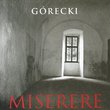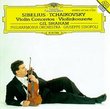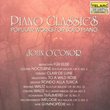| All Artists: Arnold Schoenberg, Robert Craft, Jennifer Lane, Philharmonia Orchestra of London, Melanie Diener, Martyn Hill, Stephen O'Mara Title: Schoenberg: Gurre-Lieder Members Wishing: 1 Total Copies: 0 Label: Naxos Release Date: 1/18/2005 Genre: Classical Style: Opera & Classical Vocal Number of Discs: 1 SwapaCD Credits: 1 UPC: 747313251827 |
Search - Arnold Schoenberg, Robert Craft, Jennifer Lane :: Schoenberg: Gurre-Lieder
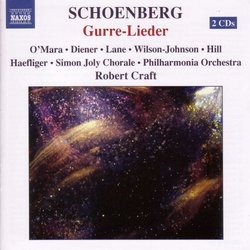 | Arnold Schoenberg, Robert Craft, Jennifer Lane Schoenberg: Gurre-Lieder Genre: Classical
|
Larger Image |
CD DetailsSimilar CDs
Similarly Requested CDs
|
CD ReviewsEqual to the Best Recordings of Gurre-Lieder J Scott Morrison | Middlebury VT, USA | 02/16/2005 (5 out of 5 stars) "Robert Craft is not ordinarily thought of as a master of ultraromantic music. One associates him with Stravinsky and the more advanced music of the Second Viennese School. Schoenberg was certainly the founder and guru of that movement, but his 'Gurre-Lieder' was composed before he ventured into atonality. It is a huge Romantic work, almost two hours long, that could almost have been written by Wagner or Strauss. It calls for huge forces--an expanded orchestra, a huge chorus, vocal soloists and a narrator--and it is difficult to mount. But it has fared very well on records and I will admit that I had some doubts about whether a recording conducted by Craft with virtually unknown soloists would be competitive. I need not have feared. Craft, whom I associate with no-nonsense tempi, takes it rather slowly, luxuriating in the post-romantic textures and allowing the sound to bloom, and he has superb musical collaborators here. Indeed, this is a great performance. The singers are unexpectedly quite good. Melanie Diener, the Tove, may not be as lush-voiced as Jessye Norman on Ozawa's recording, but she certainly doesn't have to take a back seat to her either. Her voice rings out thrillingly with ardor. Stephen O'Mara, tenor, as Waldemar is equally thrilling. I'd never heard of him but I can easily imagine him singing Siegmund at the Met or Bayreuth. In her brief appearance as the Wood-Dove, Jennifer Lane sings with a voluptuous mezzo. Surprisingly, to me, Martyn Hill, a tenor I've always found to be rather light-voiced, sings the scene of Klaus-Narr both firmly and with dramatic aptness. The brief appearance of the Peasant is sung nicely by bass David Wilson-Johnson. Veteran tenor, Ernst Haefliger, now in his eighties, speaks the Poet's lines in a modified Sprechstimme, effectively done. The Simon Joly Chorus sing their parts with rich sonority and thrust. Of course, Gurre-Lieder is notable for its dense and important orchestral sections. The Philharmonia are simply marvelous; I'd venture to say they are more effective than the Boston Symphony in the old Ozawa recording and the equal of Rattle's Berlin Philharmonic. Just listen to the Prélude that begins the piece. But even more, listen to their accompaniments of the singers. A note about that: The singers are not highlighted quite as much as one might expect, and indeed they sound much as they might in a live performance in a hall. The only times I've heard Gurre-Lieder live there have been moments when the orchestra all but drowns out the soloists. That doesn't happen here, but at times it comes close. This is, I think, what Schoenberg wanted, actually, since the erotic ecstasy of Jens Peter Jacobsen's text is conveyed as much by orchestral texture as by voices. And speaking of text, Naxos does not print either the German text or an English translation, and there is not much of a synopsis provided. The German text can be found at the Naxos website. And I found a webpage elsewhere (that of Vox Records) that provides both German text and English translation. It is here: [http://www.cd101.net/VBX204notes.html] This performance originally appeared on Koch International, not all that long ago; the recording itself was made in Watford [England] Colosseum in October 2001. Heartily recommended. TT=1:57:48 Scott Morrison" Schoenberg's Gurre-Lieder on Naxos Robin Friedman | Washington, D.C. United States | 08/16/2006 (5 out of 5 stars) "I was blown away by Arnold Schoenberg's (1874 -- 1951) Gurre-Lieder, an immense work for large orchestra, chorus, four soloists and speaker which sets a text by the Danish poet Jens Peter Jacobsen (1847 -- 1885). Gurre-Lieder is a stunning, late romantic work, which Schoenberg composed around 1900-1901, but he completed the massive orchestration only in 1911. Among other things, this music will show the listener how atonal music, for which Schoenberg is best remembered, is an outgrowth ot late romanticism. There simply was no other place to take music at the time. The work is powerfully performed on this CD by the Philharmonia Orchestra and the Simon Joly Chorale conducted by Robert Craft. Unfortunately, the liner notes are not helpful in approaching the music or the story. Thus I will elaborate for the benefit of the listener who is just coming to the Gurre-Lieder. It is easy to consider Gurre-Lieder, as I did at first, as an overblown, decadent romantic work -- Wagner and Mahler carried to yet further excess. The work has these components indeed. It has a medieval setting in the remote world of Danish kings. The work begins in melancholy twilight and the story revolves around the love affair between King Waldemar and his mistress Tove. Tove dies at the hand of the jealous queen, and Waldemar curses God. In punishment, he too dies and is condemned to ride through the woods with his retinue of ghosts and former followers in search of Tove. All this, and Schoenberg's music setting the story, is surely the stuff of late romanticism, but the poem and music take a turn. In a pivotal section, Waldemar and his quest are mocked by a jester, Klaus-Norre, who complains that he is denied the rest of the grave by Waldemar's passion. Waldemar's men eventually return to their graves followed by a long spoken section which celebrates the beauty of life and nature and the joy of being alive. The work concludes with an enormous hymn of praise to the sun, in a traditional key of C major. The finale is the only portion of this work in which the full orchestra and massive chorus are both utilized. Thus, Gurre-Lieder opens in a spirit of late-romantic decadence, but it turns to a world of realism and hope. The critic Malcolm MacDonald offered an excellent analysis of Gurre-Lieder in his book "Schoenberg" in the Master Musicians Series, concluding that the work as a whole was "very far from the ambiguous 'love-death' of Tristan, and equally far from the conventional idea of 'decadent" late-Romanticism." (p. 96) Gurre-Lieder rests not on the story but on the music Schoenberg composed for it, which is passionate in the extreme, full of contrasts, and lyrical passages for the soloists and detailed writing for the orchestra. The work opens with an orchestral prelude featuring the light sounds of the harp, and the lengthy orchestral interludes throughout the work do much to carry it forward. The lengthy Part I of the work consists of eight increasingly intense love songs performed alternately by Waldemar and Tove. Part I concludes with a desparing "song of the wood dove" announcing the death of Tove at the instigation of the queen. The very brief Part II continues the tone following Tove's death as Waldemar curses God. The final part III includes songs in which Waldemar continues his quest in death, erie passages for choruses of his men, as well as more down-to earth passages for a peasant who watches the strange action, the fool, and, ultimately the speaker and full ensemble in a paean of praise to the sun and life. The Gurre-Lieder is rarely performed live due to its length and the massive forces it requres. But it is beautifully served on this CD. For those listeners wanting to explore a work that straddles the boundaries between late romanticism and contemporary sensibility, Gurre-Lieder is an appropriate place to start. Robin Friedman" The orchestra is radiant Jonathan P. Higgins | Madison, WI United States | 02/15/2006 (5 out of 5 stars) "Some of the singing is a little uneven on this recording. When it's good it's very good. When it's off, at least the orchestra still sounds wonderful. The Gurre-Lieder is one of the most bombastic works of the late romantic period. If Wagner and Mahler had the bombast knob up to 10, Schoenberg added and used 11. One thing that gets lost a lot when people only consider Schoenberg's atonal and serial music is that he could write some sublimely lyrical melodies and these medlodies, a rich harmonic pallate and mindblowing orchestration make the Gurre-Lieder one of the most beautiful works from the period. Robert Craft lets the music sing in the bombastic, passionate romantic way it needs to sing. It even sent a few chills down my spine."
|

 Track Listings (12) - Disc #1
Track Listings (12) - Disc #1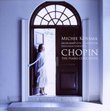
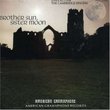

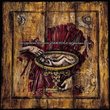


![Across The Universe [Deluxe Edition]](https://nationalbookswap.com/cd//m/51/1251/1241251.jpg)
